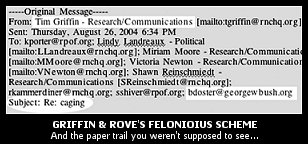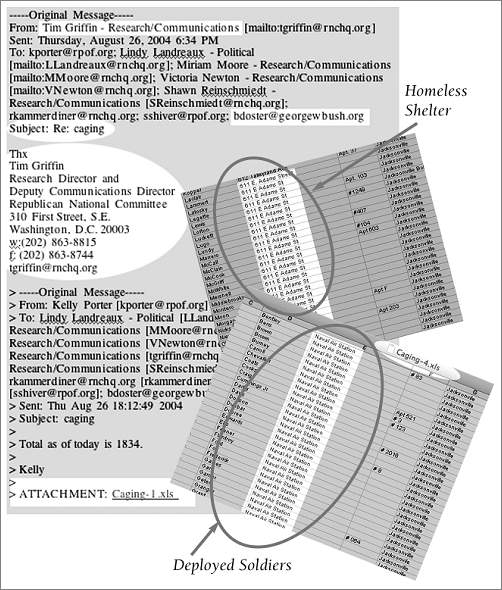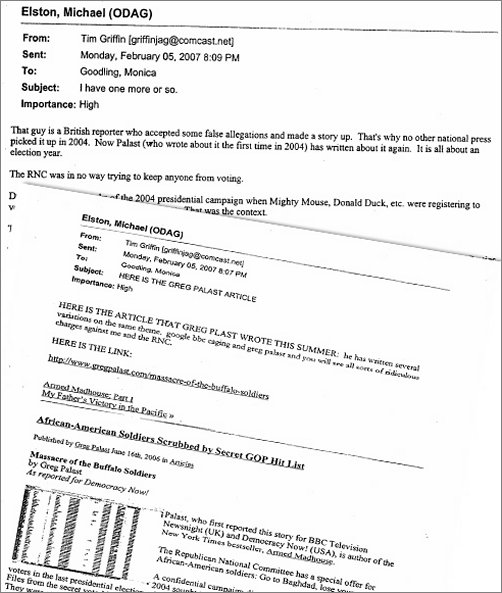The Framers Got It Right: Congress is the Decider
Created by
evan_at_rockridge (Rockridge Institute staff member) on Friday, May 25, 2007 04:35 PM --->
In this new article by George Lakoff and Glenn Smith, the Rockridge Institute issues a call to action in response to Congress's passage of the Iraq supplemental spending bill.
Critics of Congress's passage this week of the Iraq supplemental spending bill lament a lack of political courage. But Congress would find it easier to act courageously if the public understood the constitutional stakes. And that public understanding requires correct and persistent framing by Congress itself. What needs to have been framed — indeed what still needs to be framed — is Congress's constitutional responsibility and power to set the course on military missions like Iraq.
Here is what two of the country's most distinguished scholars on Constitutional powers testified to Congress on January 30, 2007:
"Congress possesses substantial constitutional authority to regulate ongoing military operations and even to bring them to an end."
— David J. Barron, Harvard Law School"The legislative judgment to take the country to war carries with it a duty throughout the conflict to decide that military force remains in the national interest. ... Congress is responsible for monitoring what it has set in motion. In the midst of war, there are no grounds for believing that the President's authority is superior to the collective judgment of its elected representatives. Congress has both the constitutional authority and the responsibility to retain control and recalibrate national policy whenever necessary."
— Louis Fisher, Constitutional Specialist, Library of Congress (PDF)
Here's what this means:
The Framers of the Constitution framed the current debate over Iraq: Congress sets the overall strategy, and retains control over troop levels, redeployment dates, etc. The president's job is to carry out the strategic mission set by Congress.
The United States Constitution designates Congress as The Decider: they decide on overall military strategy. That is their constitutional duty. The president is the commander in chief of the military — and only the military. He is not commander over Congress, nor is he commander over the people of the United States. As such, the president's duty is to carry out the strategic mission given to him by Congress.
But Congress has abdicated its duty.
Congressional leaders have neglected to remind the nation what the Constitution says. They have allowed the president to reframe the Constitution, usurping their power for himself. The Framers framed it right. The Congress irresponsibly let the president reframe the Constitution.
The issue is more than the vital details of Iraq spending, withdrawal, timetables, and the safety of our troops. The issue is whether Congress will continue to allow the president to exercise dictatorial powers. Or whether Congress will insist on the framing of the Framers.
Framing has been vital. Opponents of the president's Iraq policies should have framed the issue immediately when Democratic leaders took control in January 2007. The message should have been: Congress defines the strategic mission; the president's job is to carry it out. He is refusing to carry out his mission.
Congress allowed the president to take over its job to decide the strategic mission and to put Congress in the role of merely providing funding. This allowed the president to cast Congress in the role of "refusing to fund the troops," "endangering the safety of our troops," "playing chicken with the lives of our troops," "hamstringing our troops," and so on. It allowed President Bush to portray Congress as responsible for the safety of our troops, whereas the real responsibility lay with him. By allowing the president to reframe the Constitution and take away their powers, Congress made itself fatally vulnerable. Most of the Democrats wound up adopting the president's framing of them as responsible for the safety of the troops.
Senate Majority Leader Harry Reid
excused the vote by saying that the Democrats did not have a veto-proof Congress. But they did not need one. They could have chosen to exercise their authority by refusing to pass a spending bill without redeployment timetables.
House Appropriations Committee chairman David Obey
said it was the best deal Congress could make because "the White House is in a cloud somewhere in terms of understanding the realities of Iraq." This is tantamount to saying that Congress has no choice but to accede to an irrational demand of the President.
Representative Louise Slaughter defended her vote
this way:
"As such, we had a choice. We could send Mr. Bush the same bill, or allow something to pass that wouldn't be vetoed. And we elected to let something pass - to let Republicans, if they so choose, fund their own war.Considering that 90% of the Out of Iraq Caucus was with us in this decision, there must have been at least some reason for it. In fact, there are two in my opinion. With this White House, and with this Republican minority, it is safe to say that a standoff with the Administration would have meant that our troops would be left in harm's way, only now with even less funding to back them up. I don't think that would have been right to do - to make them do even more with even less. The President doesn't seem to care how much our troops suffer. All evidence indicates that he will make them fight if they have needed funding or not.Secondly, a standoff would have allowed the President to keep using our soldiers as pawns, accusing Democrats of abandoning them while it is really his war that has left them to fend for themselves."
In other words, allowing themselves to be framed in a subordinate position, many who originally voted to impose timetables retreated, thinking that they were forced to accept the president's framing of them. And being progressives — with the fundamental values of empathy and responsibility — they were doubly trapped. Their empathy for the troops — and their inability to take on their Constitutional role — forced even many Out of Iraq Caucus members to vote against their own position.
Now, one might read the Constitution a bit differently, perhaps maintaining that the Congress is only co-equal with the president. But that still does not put the president in a superior position and Congress in the position of merely a funding funnel for the mission he determines. Even under this interpretation, Congress has abdicated its Constitutional duty.
If you mistakenly believe that framing is mere PR or spin, recall that there is a reason why we speak of the "Framers" of the Constitution. All of our concepts come in the form of frames. Our deepest values and most enduring truths were "framed" by our "Framers." To protect those values and those truths requires the right framing. And to remind the public of those values and truths requires repeating over and over how the Framers framed our form of government, and why it matters today. Framing is a matter of life and death — and the survival of our democracy.
Many public critics of the Iraq occupation have accused the Democrats of cowardice, of weakness, of "caving in" — even of "betraying" the American people who voted for withdrawal from Iraq. But that is too easy a judgment. The result was determined in January 2007 when they allowed the president to reframe the Constitution.
The good news is that the present spending authorization is for "only" until September. We have until then to get the Framers' framing right. By "we," we don't mean just those in Congress, or those on the blogs. We mean the progressive grassroots throughout the country. We all need to act, and we can!
But before discussing actions, it is important to recognize other framing mistakes that need to be avoided.
Using the term "war." Literally, a war is a battle between two armies over territorial control. It is over when one army defeats the other. That happened in May, 2003, with the removal of Saddam Hussein's regime and when President Bush stood on that battleship under the "Mission Accomplished" banner. At that point an "occupation" began — an "occupation" of a country engaged in ethnic and religious conflict. Bush is technically no longer a war president; he is an occupation president. "War" has given the president a chance to claim extraordinary powers. There are other terms to use: occupation, military engagement, military operation, and so on. If Senator Jim Webb can use the term "occupation," as he did in his campaign, so can every other elected official.
"The power of the purse." Controlling appropriation is a constitutional duty. Referring to this duty with such a dismissive term promotes the idea that the president sets the mission and the job of Congress is just a cashier.
"Providing a check on presidential power." This sounds like Congress is just getting in the way, keeping the president from exercising his legitimate authority.
"Micromanaging the war," "overriding the commanders in the field." Congressional leaders should never let the president get away with such claims. Congress sets the overall policy agenda. The job of the commander-in-chief is to carry out that agenda, making sure that the commanders in the field are serving the Congressional mission. Say this over and over.
Permitting the Betrayal Myth: America, as a moral country with a strong military, should defeat all enemies. If America does lose a war, it is a result of too little support at home. In other words, but for betrayal, our good intentions and military might would win all conflicts. If the U.S. loses, the opponents of the military operation at home are to blame for "not supporting our troops," and for "undermining their morale."Progressives must point out that it is the president, with an enabling Congress, who commenced a foolhardy adventure with no clear exit strategy or way to "win." That same president has refused to properly prepare or adequately equip soldiers — and now he is blaming Congress. When Congress passed a supplemental spending bill with reasonable timetables attached, he refused it. The betrayer is the president. Say it over and over: The president has betrayed our troops and the nation.
Allowing the question to be asked whether "Congress has a constitutional duty to fully fund troops during wartime." It is Congress that determines what "wartime" is.That is its Constitutional duty. The president does not have the Constitutional authority to declare whether we are at war. Only Congress has that authority, and it can only exercise it for at most two years at a time.The president wants the country to believe that he is the soldier's protector and Congress is the villain. This is a cynical, revisionist narrative. The storyline that must be maintained casts Congress as the helper of heroic troops, the president as the false-hero or villain who sent them into harm's way inadequately armed and unprotected on a mission based upon lies. It is Bush who, with his veto, stood in the way of providing the troops with the funding they need. Progressives have missed this framing opportunity.
The continued abdication of the proper Constitutional role for Congress comes from the fear of blame for military casualties. Opponents of the Iraq occupation are concerned, and rightly so, that the Bush administration will frame killed or wounded soldiers as victims of Democratic mismanagement or partisan politicking. It is a fair guess that Democratic consultants are fretting that, if the Democratic Congress takes control of setting the mission in Iraq, Bush will lift the blackout on news coverage of returning injured and dead U.S. soldiers, using them as props in allegations that the casualties are the fault of "politicians." Progressives must publicly confront the president about this as they reclaim their Constitutional power, derailing any attempt to shift responsibility.
Those are the pitfalls to be avoided. Now it is time to plan a course of unified grassroots action.
ACTION: Write to your Congresspersons and Senators and ask them to frame their Constitutional role as the Framers did. We suggest that you raise the following issues:
The Constitution provides Congress with the power to define the military agenda, including troop re-deployment and the establishment of timetables.
The role of the president is to carry out the agenda defined by Congress.
Congress must continuously assert its Constitutional power and responsibility.
Congress must not give in to the betrayal myth. The president was offered funding with timetables but he turned it down — he is the betrayer.
Congress must frame the matter as an issue of Constitutional authority
Congress must place the safety of the troops directly in the hands of the commander-in-chief, whose job is to carry out the agenda given by Congress, which includes protecting the safety of our troops.
Don't just write to your Congressperson. Write to the editors of your local newspapers. Flood the email boxes of the television and radio news shows, as well as national magazines. Send this call for action to your email lists. And write to progressive activist organizations like MoveOn, Democracy for America, and so on, to ask their memberships to support this action.
And don't do it just once. Repetition is the key to success. Keep it up until the next funding vote in September.
Research Assistant Christina M. Smith contributed to this report.
 If Rudy Giuliani thought he silenced Ron Paul at the FOX News debate — by displaying his own ignorance, ironically — he was sadly mistaken. The remarks may have drawn loud applause, but they were factually inaccurate and Ron Paul continues to hammer him for it. Last week Paul gave Rudy a reading assignment starting with the 9/11 Commission report.
If Rudy Giuliani thought he silenced Ron Paul at the FOX News debate — by displaying his own ignorance, ironically — he was sadly mistaken. The remarks may have drawn loud applause, but they were factually inaccurate and Ron Paul continues to hammer him for it. Last week Paul gave Rudy a reading assignment starting with the 9/11 Commission report. The warmongerererer—William "the Bloody," Kristol got a call from a White House official telling him that Bush was furious, just furious with the NY Times article that says the administration is debating whether to cut the troop levels in half in 2008.
The warmongerererer—William "the Bloody," Kristol got a call from a White House official telling him that Bush was furious, just furious with the NY Times article that says the administration is debating whether to cut the troop levels in half in 2008.
 On Tuesday, peace activist Cindy Sheehan appeared on The Ed Schultz Show to talk about her
On Tuesday, peace activist Cindy Sheehan appeared on The Ed Schultz Show to talk about her  "Is this the real reason?"
"Is this the real reason?" 








 Jon
Jon

 The perplexed committee members hadn't a clue --- and asked no substantive questions about it thereafter. Karl Rove is still smiling. If the members had gotten the clue, and asked the right questions, they would have found "the keys to the kingdom," they thought they were looking for. They dangled right in front of their perplexed faces.
The perplexed committee members hadn't a clue --- and asked no substantive questions about it thereafter. Karl Rove is still smiling. If the members had gotten the clue, and asked the right questions, they would have found "the keys to the kingdom," they thought they were looking for. They dangled right in front of their perplexed faces.

 Here's a 60 Minutes interview from 12/04 that was his first interview in like 20 years.
Here's a 60 Minutes interview from 12/04 that was his first interview in like 20 years.

